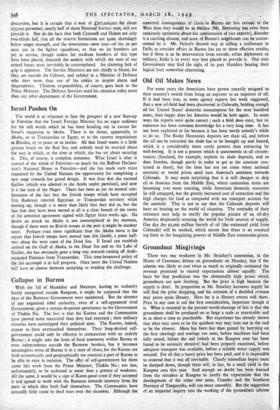Collapse in Burma
With the fall of Mandalay and Maymyo, leaving its authority barely recognised outside Rangoon, it might be supposed that the days of the Burmese Government were numbered. But the absence of any organised rebel authority, even of a self-appointed rival Government, gives a certain desperate persistence to the Government of Thakin Nu. The fact is that the Karens and the Communists have proved more successful than they had expected ; their military victories have outstripped their political aims. The Karens, indeed, appear to have overreached themselves. Their long-desired self- government could only be effective in conjunction with an orderly Burma ; it might take the form of local autonomy within Burma or even independence outside the Burmese borders, but it becomes meaningless when all Burma is in a state of chaos, for the Karens are bc!h economically and geographically too essential a part of Burma to be able to exist in isolation. The offer of self-government for them came this week from the Prime Minister, Thakin Nu ; too late, unfortunately, to be reckoned as more than a gesture of weakness. All the same, it would be a sign of Karen good sense if they accepted it and agreed to work with the Burmese towards. recovery from the mess in which they both find themselves. The Communists have naturally little cause to shed tears over the situation. Although the
economic consequences of chaos in Burma are less serious to the West than they would be in Malaya (Mr. Bottorriley has even been cautiously optimistic about the continuation of rice exports), disorder is a catching disease, and none of Burma's neighbours can be uncon- cerned by it. Mr. Nehru's shrewd step in calling a conference in Delhi to consider affairs in Burma has yet to show effective results, but if there is to be intervention from outside, either diplomatic or military, India 'is in every way best placed to provide it. Our own Government may find the sight of its past blunders bearing their logical fruit somewhat chastening.






































 Previous page
Previous page